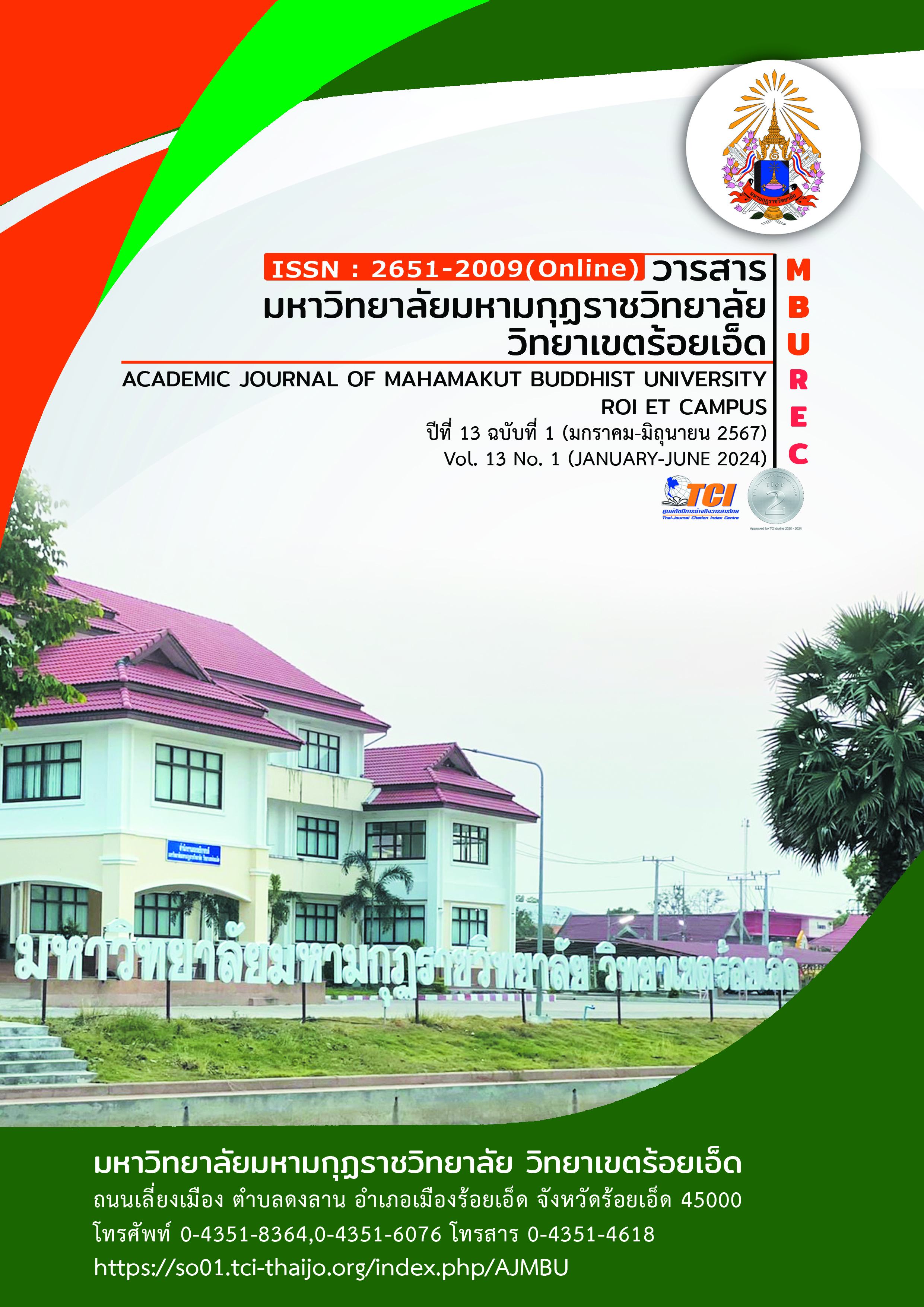THE DEVELOPMENT OF LEARNING ACTIVITIES AN INQUIRY-BASED LEARNING (5E) TO DEVELOP SCIENCE LEARNING ACHIEVEMENT FOR GRADE 5 STUDENTS
Main Article Content
Abstract
The purposes of this study were 1) investigate efficiency of the lesson plan on the learning, the science class in the fifth grade of primary school was about the appearance cycle of constellations. By using a 5 Es of Inquiry-Based Learning management to be effective according to the 80/80 criteria. The target group used in the research were the fifth grade of primary school in the second semester of the academic year 2020, Sueksa Songkhor Thawatchaburi School, Office of Special Education Administration. Obtained by purposive sampling of 20 people. The tools used in this study were: 1. Learning management plan, the science class in the fifth grade of primary Unit 4 The cycle of the appearance of the constellations. By using a 5 Es of Inquiry-Based Learning management, 16 plans, totaling 16 hours of study time. 2. Achievement test Science subject, Grade 5, Learning unit 4 “The cycle of the appearance of constellations”. It is a multiple-choice test with 4 options, 30 questions. 3. The attitude measurement form the fifth grade of primary school. The form has a 5-level approximate scale, totaling 20 items. Statistics used in data analysis were percentage, mean and standard deviation.
The results of the study appear as follows: 1) Efficiency of the Learning Management Plan for Subject Science in the fifth grade of primary school on the cycle of the appearance of the constellation, using a 5 Es of Inquiry-Based Learning management to achieve efficiency 80.57/81.5, which meets the criteria set forth, namely 80/80. 2) Comparison of learning achievement between pre-school and post-school with a learning management plan on the subject Science, Grade 5 on the cycle of the appearance of the constellations by using a 5 Es of Inquiry-Based Learning management. It appears that the average score of the test. The pretest scores were 12.35 and the mean scores after the test were 24.45.After learning, learning achievement was higher than before learning at a statistical significance at the .01 level. 3) The student's attitude toward learning by using a 5 Es of Inquiry-Based Learning management in the subject Science, Grade 5 on the cycle of the appearance of the constellations. Overall, it was at the highest level the mean scores were 4.91 and the standard deviation was 0.29.
Article Details

This work is licensed under a Creative Commons Attribution-NonCommercial-NoDerivatives 4.0 International License.
References
กรมวิชาการ. (2553). แนวทางการจัดกิจกรรมพัฒนาผู้เรียนตามหลักสูตร การศึกษาขั้นพื้นฐานพุทธศักราช 2551. พิมพ์ครั้งที่ 2. กรุงเทพมหานคร : โรงพิมพ์คุรุสภาลาดพร้าว.
กระทรวงศึกษาธิการ. (2560). ตัวชี้วัดและสาระการเรียนรู้แกนกลางกลุ่มสาระการเรียนรู้วิทยาศาสตร์ (ฉบับปรับปรุง พ.ศ. 2560) ตามหลักสูตรแกนกลางการศึกษาขั้นพื้นฐาน พุทธศักราช 2551. กรุงเทพมหานคร : โรงพิมพ์ชุมนุมสหกรณ์การเกษตรแห่งประเทศไทย.
ชัยวัฒน์ สุทธิรัตน์. (2558). 80 นวัตกรรมการจัดการเรียนรู้ที่เน้นผู้เรียนเป็นสำคัญ. กรุงเทพมหานคร : แดเน็กซ์อินเตอร์คอร์ปเปอเรชั่น.
ทรายแพรว ไชยมัชชิม. (2563). การพัฒนากิจกรรมการเรียนรู้วิทยาศาสตร์ตามแนวคิดการใช้สมองเป็นฐานร่วมกับการสอนแบบสืบเสาะหาความรู้ (5Es) เรื่อง น้ำเพื่อชีวิตและอากาศรอบตัวเรา กลุ่มสาระการเรียนรู้วิทยาศาสตร์สำหรับนักเรียนชันประถมศึกษาปีที่ 3. วิทยานิพนธ์ครุศาสตรมหาบัณฑิต สาขาวิชาหลักสูตรและการสอน. บัณฑิตวิทยาลัย : มหาวิทยาลัยราชภัฏสกลนคร.
บดินทร์ ปัดถาวโร. (2560). การพัฒนาผลสัมฤทธิ์ทางการเรียนและการคิดเชิงวิทยาศาสตร์ชั้นประถมศึกษาปีที่ 5 โดยใช้กิจกรรมการเรียนรู้แบบสืบเสาะหาความรู้ 5 ขั้น ที่ส่งเสริมกระบวนการคิดเชิงวิทยาศาสตร์. วารสารศึกษาศาสตร์ มหาวิทยาลัยมหาสารคาม. 8(3). 91-102.
ภพ เลาหไพบูลย์. (2550). แนวการสอนวิทยาศาสตร์. พิมพ์ครั้งที่ 2. กรุงเทพมหานคร : ไทยวัฒนาพานิช.
มินตรา รุ่งรังษี. (2561). การจัดการเรียนรู้แบบสืบเสาะหาความรู้โดยใช้กระดานอัจฉริยะที่มีต่อผลสัมฤทธิ์ทางการ เรียนและเจตคติต่อวิชาวิทยาศาสตร์ของนักเรียนชั้นมัธยมศึกษาปีที่ 4. วิทยานิพนธ์วิทยาศาสตรมหาบัณฑิต สาขาวิชาวิทยาศาสตร์ศึกษา. บัณฑิตวิทยาลัย : มหาวิทยาลัยราชภัฏนครสวรรค์.
โรงเรียนศึกษาสงเคราะห์ธวัชบุรี. (2561). หลักสูตรสถานศึกษา พุทธศักราช 2561. ร้อยเอ็ด : โรงเรียนศึกษาสงเคราะห์ธวัชบุรี อำเภอธวัชบุรี จังหวัดร้อยเอ็ด.
วิมลรัตน์ สุนทรวิโรจน์. (2553). การออกแบบการเรียนรู้ตามแนวคิด Backward Design. มหาสารคาม : ภาควิชาหลักสูตรและการสอน มหาวิทยาลัยมหาสารคาม.
ศรัณย์ วรรณศิริ. (2560). การพัฒนาผลสัมฤทธิ์ทางการเรียนเรื่องเอกภพ กลุ่มสาระการเรียนรู้วิทยาศาสตร์ ชั้นมัธยมศึกษาปีที่ 3 โดยใช้การจัดการเรียนรู้แบบสืบเสาะ 5 ขั้น ร่วมกับสื่อมัลติมิเดีย. วิทยานิพนธ์ครุศาสตรมหาบัณฑิต สาขาวิชาหลักสูตรและการเรียนการสอน. บัณฑิตวิทยาลัย : มหาวิทยาลัยราชภัฎมหาสารคาม.
สุเมธ เนาว์รุ่งโรจน์. (2561). การศึกษาผลสัมฤทธิ์ทางการเรียน เรื่อง การถ่ายทอดลักษณะทางพันธุกรรมที่จัดการเรียนรู้ แบบสืบเสาะหาความรู้ (5E) และความพึงพอใจในการจัดการเรียนรู้ของ นักเรียนระดับชั้น มัธยมศึกษาปีที่ 6 โรงเรียนห้วยยอด จังหวัดตรัง. วารสารนวัตกรรมการเรียนรู้. 4(1). 23-33.
สุวรรณโณ ยอดเทพ. (2562). การพัฒนาผลสัมฤทธิ์ทางการเรียนและเจตคติต่อการเรียนวิทยาศาสตร์ของนักเรียน ชั้นประถมศึกษาปีที่ 6 โดยการสอนแบบการสืบเสาะหาความรู้แบบ 5 Es. วิทยานิพนธ์ศึกษาศาสตรมหาบัณฑิต สาขาวิชาหลักสูตรและการสอน. บัณฑิตวิทยาลัย : มหาวิทยาลัยหาดใหญ่.
อับดุลเลาะ อูมาร์ (2560). ผลของการจัดการเรียนรู้แบบสืบเสาะหาความรู้ (5Es) เรื่องสมดุลเคมีที่มีต่อแบบจำลองทางความคิด ผลสัมฤทธิ์ทางการเรียน และความพึงพอใจของนักเรียนชั้นมัธยมศึกษาปีที่ 5 โรงเรียนเดชะปัตตนยานุกูล จังหวัดปัตตานี. วิทยานิพนธ์ศึกษาศาสตรมหาบัณฑิต สาขาวิชาการสอนวิทยาศาสตร์และคณิตศาสตร์. บัณฑิตวิทยาลัย : มหาวิทยาลัยสงขลานครินทร์.
Campbell, M. (2006). The Effects of the 5e Learning Cycle Model on Students' Understanding of Force and Motion Concepts. A thesis Master of Education. Department of Teaching and Learning Principles. College of Education : University of Central Florida.
Cepni, I., Sahin, M. and Ipek, M. S. (2010). Teaching floating and sinking concepts with different methods and techniques based on the 5E instructional model. Asia-Pacific forum on science Learning and Teaching. 11(2). 1-39.
Ebrahim, A. (2004). The Effects of Traditional Learning and a Learning Cycle Inquiry Learning Strategy on Student’ Science Achievement and Attitudes Toward Elementary Science. Dissertation Abstracts International. 65(1). 1232-A.
Garcia, C. M. (2005). Comparing the 5Es and Traditional Approach to Teaching Evolution in a Hispanic Middle School Science Classroom. Masters Abstracts International. 40(43). 1067.
Liu E. Z. F. and Chen P. K. (2013). The Effect of Game-Based Learning on Students’ Learning Performance in Science Learning – A Case of "Conveyance Go". Social and Behavioral Sciences. 103(2013). 1044-1051.
Qarareh, A. O. (2012). The effect of using the learning cycle method in teaching science on the educational achievement of the sixth graders. International Journal of Education Science. 4(2). 123-132.


